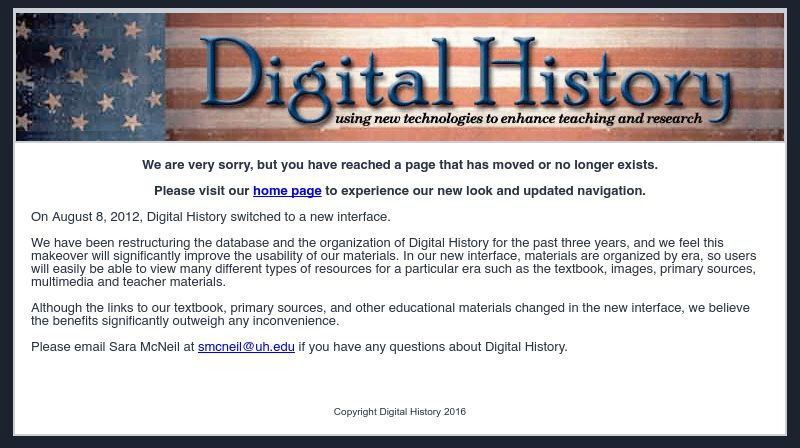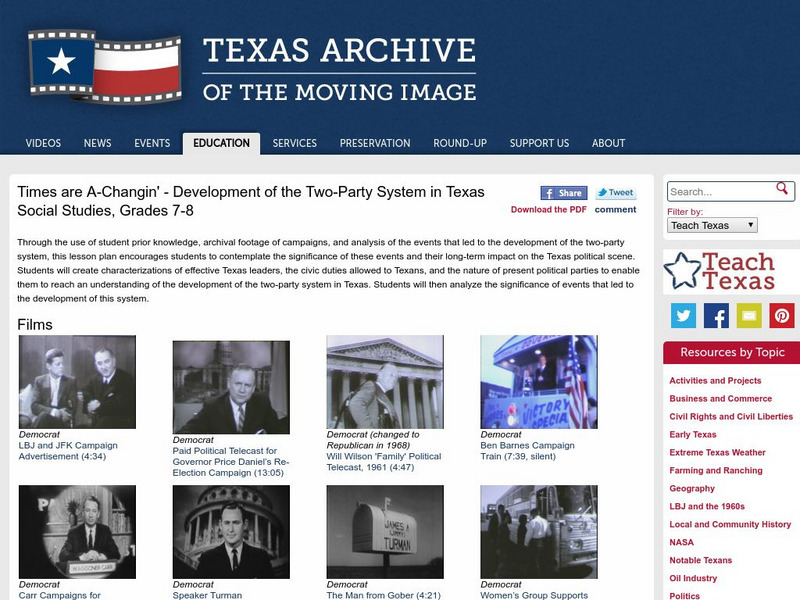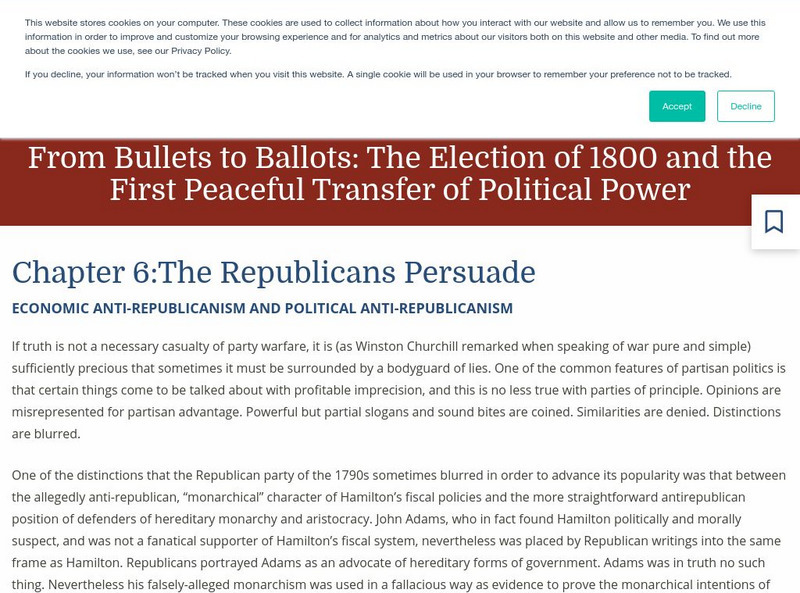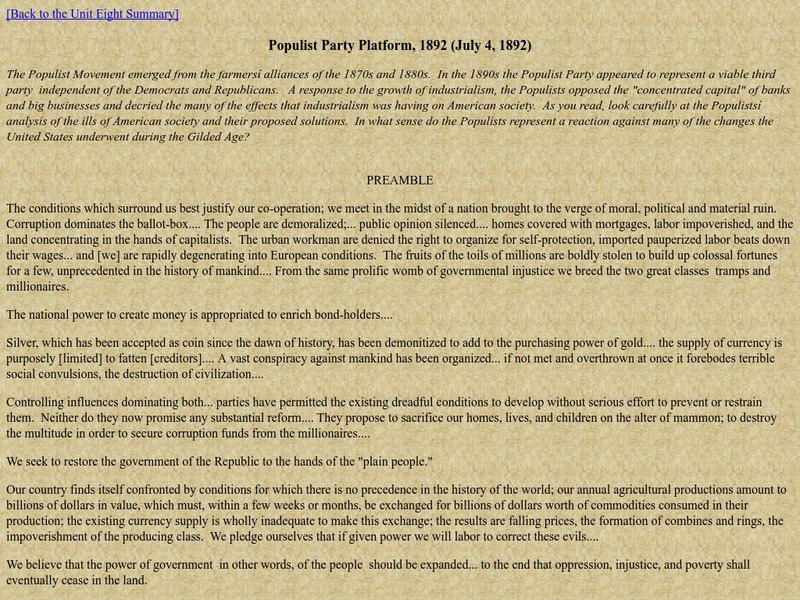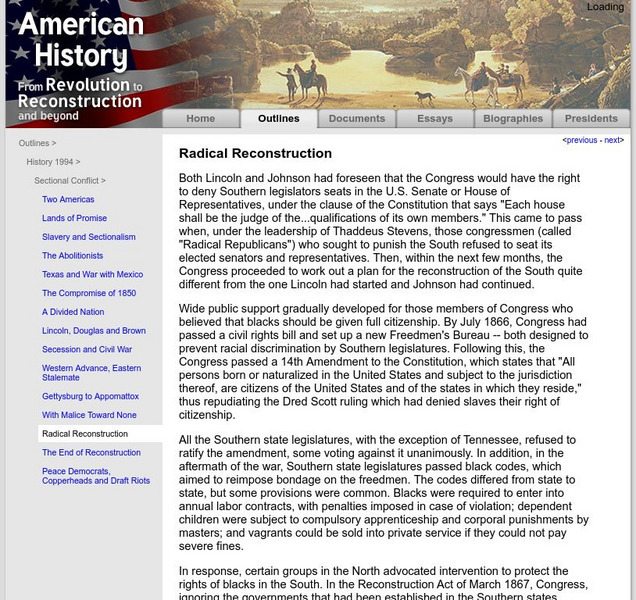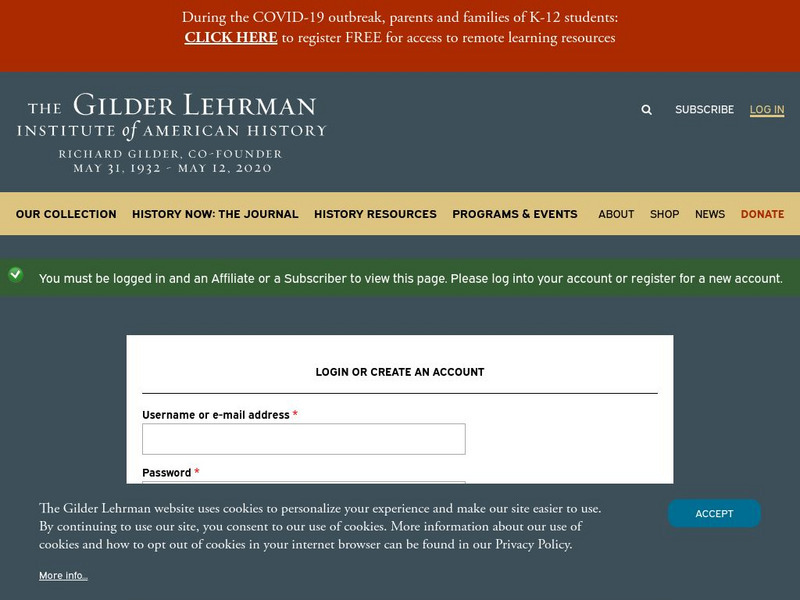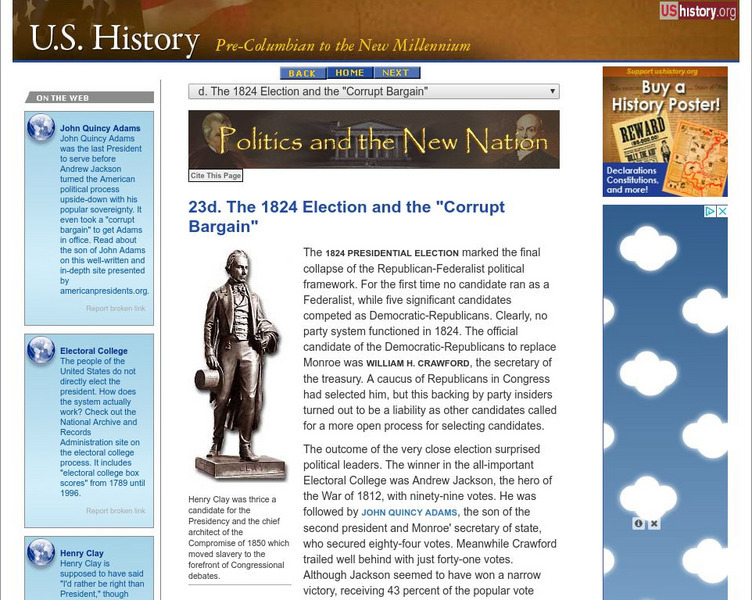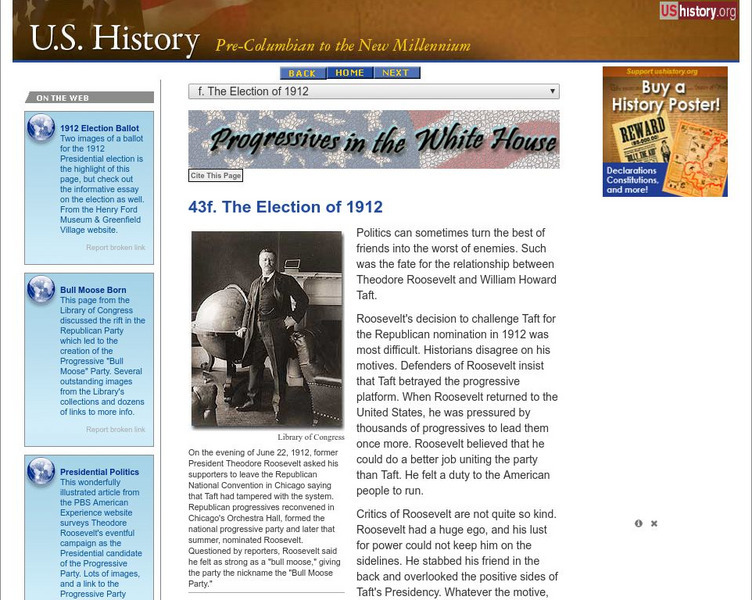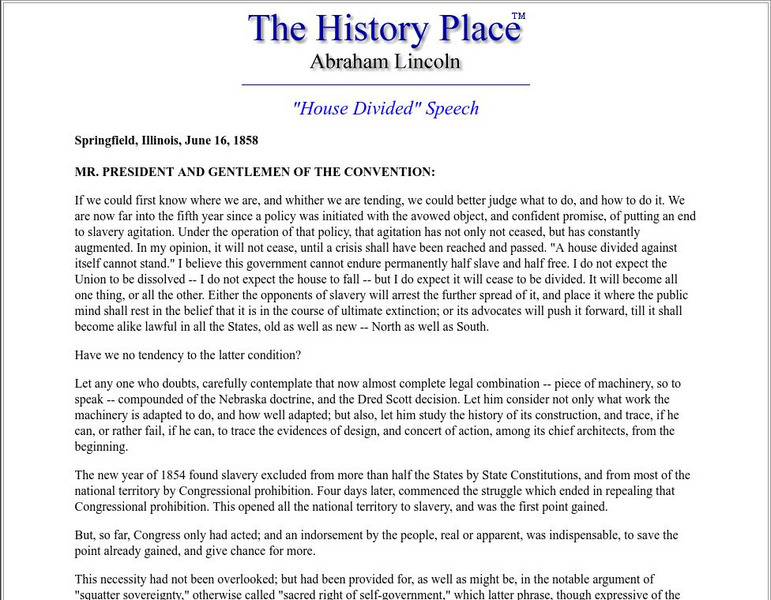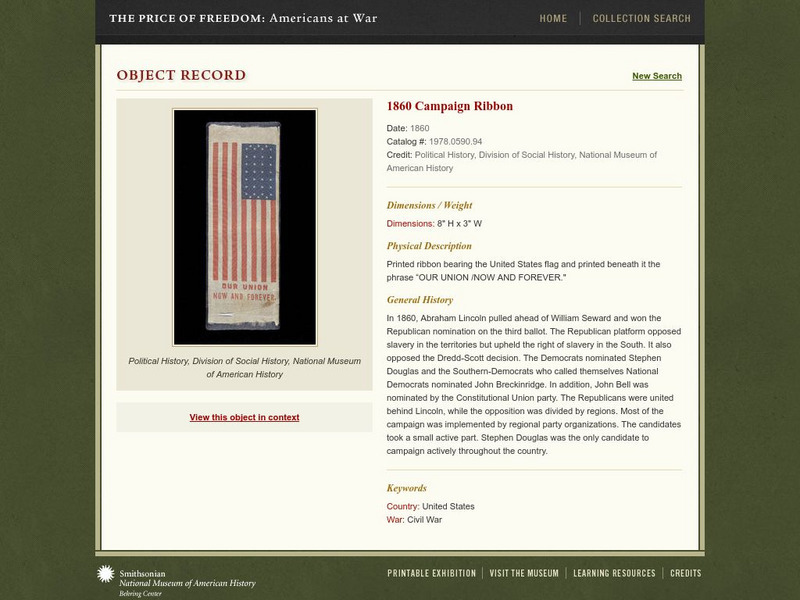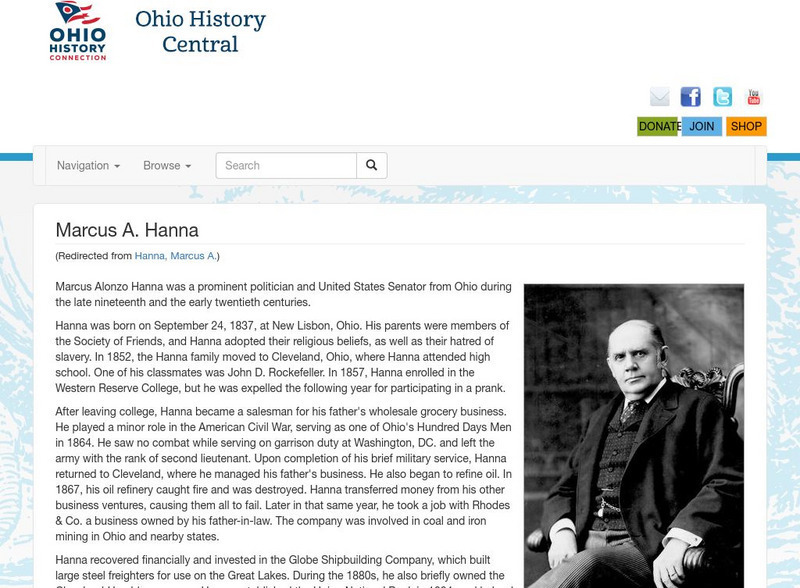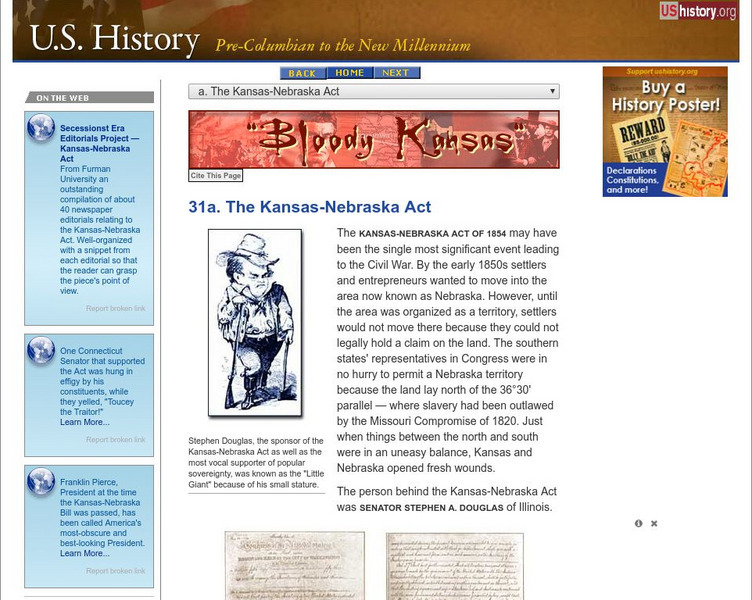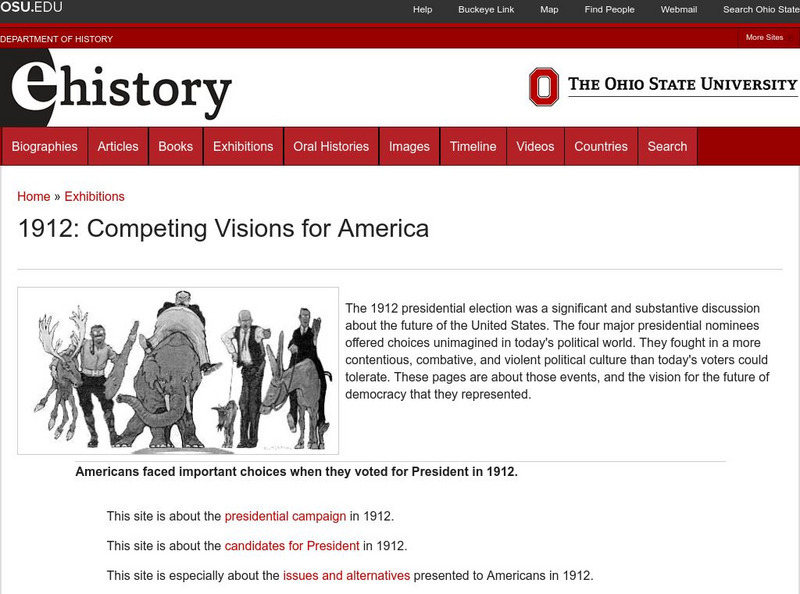Digital History
Digital History: Emergence of a New Party System
There were many reasons for splits in the first Republican party, now usually referred to as the Democratic-Republican Party. See how that changed the party itself and the ways those changes affected the election of 1824.
Ohio History Central
Ohio History Central: Radical Republicans
A good description of the beginnings of the Republican Party before the Civil War, and the transformation to Radical Republicanism during Reconstruction as they attempted to guarantee equal rights for African Americans. Information is...
Digital History
Digital History: The Breakdown of the Party System
As the Whig Party collapsed and the new Republican Party was forming, there was a flash-in-the pan party, the Know Nothing Party, that filled the void for a few years. Read about the success of the party in electing legislation, and find...
Other
Tami: Times Are a Changin' Development of the Two Party System in Texas
A collection of historical videos of political campaigns in Texas, which students analyze after an exploration of what qualities an effective political leader should have. They explore and discuss what Democrats and Republicans say in...
Teaching American History
Teaching American History: From Bullets to Ballots Chapter 6
Zvesper's book, From Bullet to Ballots, Chapter 6 introduces what anti-republicans looked like in the early days of the U.S. government. How did republicans differ from anti-republicans? What were representatives of each group?
Teaching American History
Teaching American History: From Bullets to Ballots Chapter 5
Alexander Hamilton's influences in politics among citizens seemed to create frustration with those who agreed with the philosophies of Thomas Jefferson and James Madison. The Republicans begin organizing themselves.
Other
A Brief History of American Major Parties
A good, brief history of the two party system in the United States.
Independence Hall Association
U.s. History: Two Parties Emerge
Although George Washingon denounced the creation of political parties, they came roaring into play in the election of 1796 in which John Adams, representing the Federalists, ran against Thomas Jefferson, who represented the...
Other
Fieldston School United States History Survey: Populist Party Platform
Text of the Populist Party platform in the election of 1892. You will be surprised to see how many resolutions were eventually adopted by Democrats and Republicans.
Independence Hall Association
U.s. History: Republican Philadelphia
Philadelphia today leans to the Democratic ticket in most elections. This website, ushistory.org, is completely nonpolitical, but it offers resources for right-leaning visitors to feel right at home when visiting.
University of Groningen
American History: Outlines: Radical Reconstruction
During this period of American history, the presidents were in agreement, but the Republican party had some differences. This resource provides an explanation of those differences.
Gilder Lehrman Institute of American History
Gilder Lehrman Institute: History Now: Lincoln at Cooper Union
[Free Registration/Login Required] An essay about Lincoln's speech in 1860 at Cooper Union which brought him to the attention of the national Republican Party.
Siteseen
Siteseen: Government and Constitution: Free Soil Party
This article contains an overview of the history of the Free Soil Party, its leaders, their beliefs, and eventually joined with the National Union Party to form the newly formed Republican Party in 1854.
Independence Hall Association
U.s. History: The 1824 Election and the "Corrupt Bargain"
The two-party system in presidential elections fell apart in the election of 1824. See what happened when five men, all from the Democratic-Republican Party, ran against each other. Find out why the choice of John Quincy Adams was called...
Independence Hall Association
U.s. History: The Election of 1912
William Howard Taft was a disappointment to the progressive-minded Theodore Roosevelt. Read about how he tried to be the Republican Party candidate in 1912, and when that failed, he started a third party, the platform of which was filled...
University of Groningen
American History: Biographies: Henry Carey 1793 1879
Henry Carey was the eldest son of Mathew Carey, an Irish freedom fighter who was recruited to the intelligence networks established by Benjamin Franklin, and sent to Philadelphia to run what was then the largest printing operation in...
Other
Fieldston School United States History Survey: Rugged Individualism Speech
Herbert Hoover closed his 1928 presidential campaign with this speech, an expression of the Republican Party's philosophy of rugged individualism.
Ohio State University
E History: Ballinger Pinchot Controversy
A brief, but thorough, explanation of the controversy and antagonism between Gifford Pinchot and Richard Ballinger concerning conservation and the government's role in protecting public land. Read how this issue caused a rift in the...
Digital History
Digital History: The Civil War Begins [Pdf]
The election of 1860 showed the deep divisions that split the country. With four candidates representing four very different approaches to the issue of slavery, the outcome resulted in the secession of South Carolina, followed eventually...
The History Place
The History Place: Abraham Lincoln: "House Divided" Speech
This site from The History Place provides Abraham Lincoln's famous speach given at the close of the republican state convention - "A House Divided". It is the full text of the speech.
Smithsonian Institution
National Museum of American History: Price of Freedom: 1860 Campaign Ribbon
View a photo a 1860 Campaign Ribbon and read a brief description of the contentious election of 1860. Displayed in the National Museum of American History.
Ohio History Central
Ohio History Central: Marcus A. Hanna
Read this interesting biography of Marcus Hanna, successful Ohio businessman, Repbublican Party supporter, and close friend of President William McKinley.
Independence Hall Association
U.s. History: The Kansas Nebraska Act
Read about the essential repeal of the Missouri Compromise, which had established which states could be slave and which would be free for thirty years, with the rancorous passage of the Kansas-Nebraska Act. See who supported it and why,...
Ohio State University
E History: 1912: Competing Vision for America
An evaluation of the 1912 Presidential election. Shows the competing viewpoints at this time in American history and the different aspects of the 1912 election. Click on the other links to learn more about the election through political...


